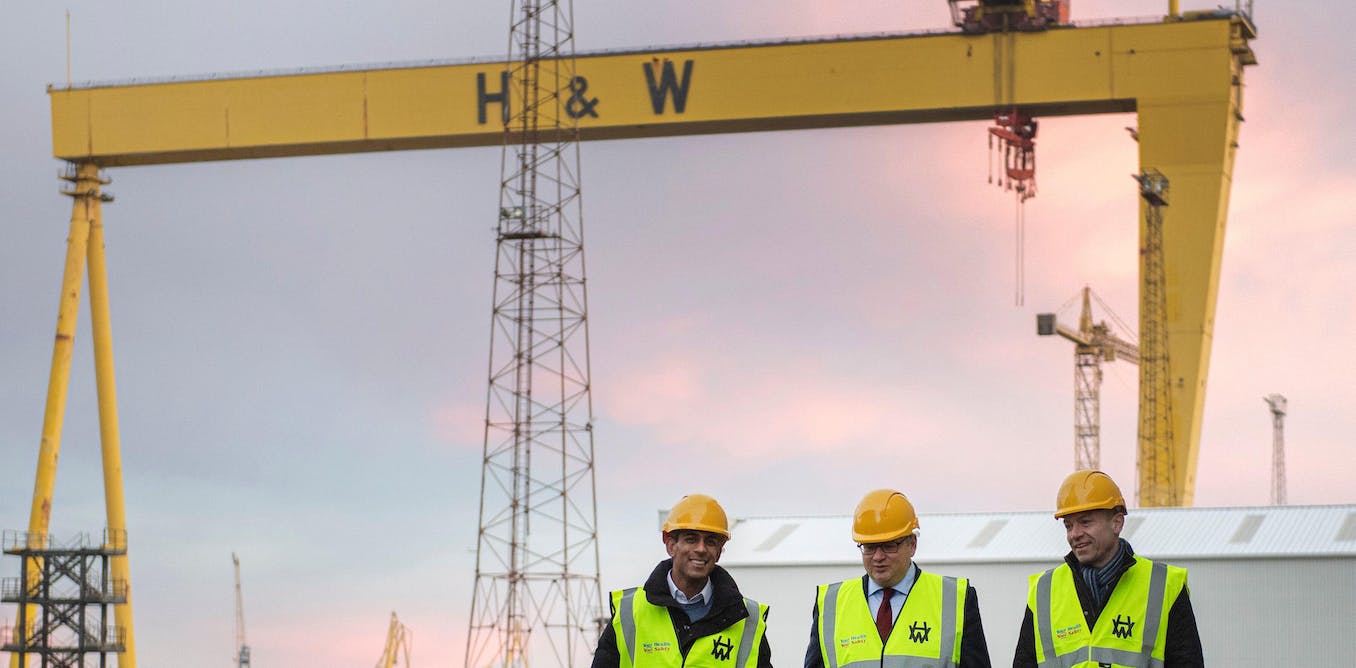UK prime minister Rishi Sunak has said Northern Ireland will be “the world’s most exciting economic zone” due to its access to the EU single market under the latest post-Brexit trading deal between the EU and UK.
The details of the Windsor framework are still being pored over by politicians and business leaders across the UK, and particularly those in Northern Ireland.
But the agreement in principle aims to address some of the weaknesses of the Northern Ireland protocol. This came into effect in January 2021 as a way to check goods travelling from Northern Ireland into the Republic of Ireland (an EU member) without creating a hard border between the two.
According to the government, it has been a “source of acute political, economic and societal difficulties in the two years since it has been operating”. The main economically significant issues addressed by the new deal relate to goods movement, retail of agriculture and food products, and medicines.
The Windsor framework aims to cut trading costs by simplifying customs checks for goods entering Northern Ireland. It will do this by reducing paperwork and shortening customs processes by relaxing some rules for internal UK trade. Many of these improvements will result from improved IT systems, data sharing and market surveillance enforcement between the EU and the UK.
Research we published in 2021 on the impact of Brexit and the protocol showed it would cause Northern Ireland’s economy to contract over the long run by up to 2.6%. And the same research suggests the new deal could mean a much smaller contraction.
We found that industries that primarily trade in goods – agriculture forestry and fishing, or food and drink – would be most affected by the protocol. Industries that mostly trade in services, such as the financial sector, would be less exposed but still negatively affected.
But with 80% of this contraction coming from trade barriers between Great Britain and Northern Ireland, any efforts to ease trade within the UK will help the region’s economy.
Our economic model used data for 2017 (pre-Brexit) to simulate how the economy might change over time after Brexit. This was based on differences in the trade costs of what Northern Irish firms buy from Great Britain (inputs), as well as sales of Northern Irish goods and services to the rest of the world including the EU (outputs).
It’s important to note that our simulation considers Northern Ireland in isolation. This means it assumes that the cost of inputs made outside the region are fixed, except for tariffs and non-tariff barriers, and that the same pre-Brexit trade agreements with non-EU countries are in place. But our results still provide some insight into how the new Windsor framework compares to the previous deal.

Jonathan Porter/Alamy Stock Photo
Great Britain is Northern Ireland’s main trade partner, providing about 65% of its imports of goods. These are not just goods directly consumed by households, but also include intermediate goods used in production by Northern Ireland’s industries. This makes the region particularly exposed to trade shocks with the rest of the UK.
Unsurprisingly, any non-tariff barrier (something other than charges or quotas) affecting inputs will increase the costs of production, which may cause increased prices for consumers.
Households in Northern Ireland also purchase products from industries that are dependent on trade with Great Britain. For example, 29% of spending on domestically produced goods occurs in the wholesale and retail industry, which is a major importer from Great Britain.
Why these results are still relevant today
A key area of focus of the Windsor framework is on the effort to reduce the paperwork need to transport and sell agricultural produce. According to the European Commission, movement of goods is simplified under the new deal by the need for “only a single general certificate” for lorries, reduced checks and “simplified procedures for plants and agricultural machinery”.
Our research shows the agriculture, forestry and fishing, and food and drinks industries had both the greatest contractions in output and the largest non-tariff barriers under the Northern Ireland protocol. So, we expect any simplifications in this area to reduce the costs of trading with Great Britain, particularly in these sectors.
The special provisions made for these sectors should also reduce some of the non-tariff barriers faced, such as the bans on particular goods and higher rates of customs checks versus other products. More generally, we expect newly streamlined customs checks and processes to help other industries face lower non-tariff barriers than under the previous arrangement.
Agricultural food and retail will likely benefit the most from the new arrangements. Northern Ireland’s GDP will still fall as a result of Brexit but if we were to repeat our simulation today, GDP would likely decrease by less than what we had predicted under the protocol.
The actual size of the economic gains from the framework versus the protocol are hard to measure at this stage. The framework does not entirely remove non-tariff barriers because goods at risk of being sold to the EU will still be checked by customs when they enter Northern Ireland.
Reductions in non-tariff barriers will also require firms to declare where goods are to be sold. And Northern Ireland will still face friction for services trade with the EU. We estimated this would account for 20% of the GDP cost of Brexit under the protocol.
So, even in the most optimistic case, where non-tariff barriers to trade between the two parts of the UK are significantly reduced, the Windsor agreement will not completely neutralise the economic impact of Brexit in Northern Ireland. But the new deal between the EU and the UK is still likely to do better for the Northern Irish economy than the protocol.










